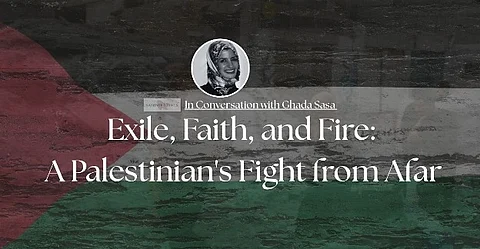

Amid the ongoing war in Gaza, countless voices remain unheard. While headlines reduce the crisis to political debates or military statistics, the human cost often disappears in the noise. The struggle of Palestinians is not just a moment in history but a lived reality, shaped by decades of displacement, oppression, and resistance.
To understand what it truly means to belong to Palestine, I spoke with Ghada Sasa, a third-generation Palestinian refugee, activist, and PhD candidate at McMaster University in Canada. Her research work critiques the colonial roots of Western environmentalism and the systemic separation of human rights from environmental concerns.
Her academic focus is deeply personal. Sasa’s connection to Palestine is etched into her identity. Her mother was from the village of Madama, near Nablus in the Israeli-occupied West Bank. Her father’s hometown, Ramla, lies within what is now called Israel—a place he was ethnically cleansed from in 1948 and to which he has been denied return ever since. She has visited Madama a couple of times, but hasn't been able to visit Ramla even once, as she has a Palestinian ID card. Palestinian ID holders are restricted from entering Israel without special permits, which are rarely granted.
“Every time I visit Madama, I feel revived—by the land’s beauty, the delicious food, the kindness of the people,” Sasa recalls. “But being in Canada, I feel like I’m dying slowly. Yes, I’m privileged to not live under occupation or bombardment, but I am far from the homeland that nourished my ancestors for centuries.”
Raised in diaspora, Sasa credits her parents for grounding her in language, faith, and history. “They taught us Arabic, about Islam, and the truth of our people’s story. We were raised to struggle for decolonization.”
On how Gaza is portrayed globally, she is blunt: “Most people now understand that Gaza is facing genocide. But mainstream media and world governments continue to defame Palestinians as aggressors, distorting the truth in shameful ways.”
What has shocked her the most isn’t just the level of violence, but the cruelty and complicity. “We saw limbs on rooftops. A five-year-old girl shot at with hundreds of bullets. All mosques, hospitals, and homes obliterated. Palestinian prisoners raped and tortured. And no less than six times the explosive power of Hiroshima dropped on Gaza. Yet world institutions remain silent or actively justify this.”
Amidst this horror, she says, “what moves me most is the resilience of the people of Gaza. Their faith. Their empathy. Their principles. They continue to resist, even on the brink of starvation, inspiring global solidarity through hunger strikes and civil disobedience.”
For many in the West or countries like India, Sasa believes the root of the conflict is misunderstood. “Palestine has endured settler colonialism since 1948. Israel expelled 800,000 Indigenous Palestinians to establish itself. This isn’t a symmetrical conflict. This is genocide.”
When asked about the meaning of resistance, Sasa emphasizes its many forms. “In a settler colonial context, just existing as a Palestinian is resistance. It can also be military, cultural, academic, or spiritual.”
One of the strongest voices from Palestine to ever raise, Muhammad Darwish, wrote, “The wars will end and the leaders will shake hands, and that old woman will remain waiting for her martyred son, and that girl will wait for her beloved husband, and the children will wait for their heroic father... I do not know who sold the homeland but I know who paid the price.”
How do these words resonate with Sasa?
She says, “Everyone knows who paid the price. But those who sold the homeland include not only Zionist regimes, but also Arab states, international institutions, and even a small group of Palestinian elites—particularly those within the Palestinian Authority—who collaborate with the Zionist entity to secure their personal socio-economic interests at the expense of their kin.”
Yet, despite all this, she holds onto hope. “I have faith in justice—both in this world and the next. Israel is being tried for genocide. The world is isolating it like never before. We are witnessing a turning point. I believe Palestine will be free by 2030.”
And the solution?
“End apartheid. End occupation. Allow the return of refugees. Give Palestinians full rights. That’s the only path to justice.”
Have you liked the news article?